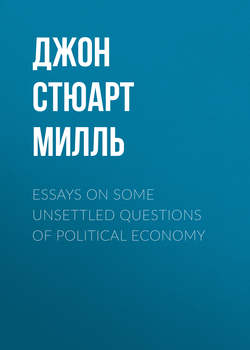Essays on some unsettled Questions of Political Economy

Реклама. ООО «ЛитРес», ИНН: 7719571260.
Оглавление
Джон Стюарт Милль. Essays on some unsettled Questions of Political Economy
ESSAY I. OF THE LAWS OF INTERCHANGE BETWEEN NATIONS; AND THE DISTRIBUTION OF THE GAINS OF COMMERCE AMONG THE COUNTRIES OF THE COMMERCIAL WORLD
ESSAY II. OF THE INFLUENCE OF CONSUMPTION ON PRODUCTION
ESSAY III. ON THE WORDS PRODUCTIVE AND UNPRODUCTIVE
ESSAY IV. ON PROFITS, AND INTEREST
ESSAY V. ON THE DEFINITION OF POLITICAL ECONOMY; AND ON THE METHOD OF INVESTIGATION PROPER TO IT
Отрывок из книги
Of the truths with which political economy has been enriched by Mr. Ricardo, none has contributed more to give to that branch of knowledge the comparatively precise and scientific character which it at present bears, than the more accurate analysis which he performed of the nature of the advantage which nations derive from a mutual interchange of their productions. Previously to his time, the benefits of foreign trade were deemed, even by the most philosophical enquirers, to consist in affording a vent for surplus produce, or in enabling a portion of the national capital to replace itself with a profit. The futility of the theory implied in these and similar phrases, was an obvious consequence from the speculations of writers even anterior to Mr. Ricardo. But it was he who first, in the chapter on Foreign Trade, of his immortal Principles of Political Economy and Taxation, substituted for the former vague and unscientific, if not positively false, conceptions with regard to the advantage of trade, a philosophical exposition which explains, with strict precision, the nature of that advantage, and affords an accurate measure of its amount.
He shewed, that the advantage of an interchange of commodities between nations consists simply and solely in this, that it enables each to obtain, with a given amount of labour and capital, a greater quantity of all commodities taken together. This it accomplishes by enabling each, with a quantity of one commodity which has cost it so much labour and capital, to purchase a quantity of another commodity which, if produced at home, would have required labour and capital to a greater amount. To render the importation of an article more advantageous than its production, it is not necessary that the foreign country should be able to produce it with less labour and capital than ourselves. We may even have a positive advantage in its production: but, if we are so far favoured by circumstances as to have a still greater positive advantage in the production of some other article which is in demand in the foreign country, we may be able to obtain a greater return to our labour and capital by employing none of it in producing the article in which our advantage is least, but devoting it all to the production of that in which our advantage is greatest, and giving this to the foreign country in exchange for the other. It is not a difference in the absolute cost of production, which determines the interchange, but a difference in the comparative cost. It may be to our advantage to procure iron from Sweden in exchange for cottons, even although the mines of England as well as her manufactories should be more productive than those of Sweden; for if we have an advantage of one-half in cottons, and only an advantage of a quarter in iron, and could sell our cottons to Sweden at the price which Sweden must pay for them if she produced them herself, we should obtain our iron with an advantage of one-half, as well as our cottons. We may often, by trading with foreigners, obtain their commodities at a smaller expense of labour and capital than they cost to the foreigners themselves. The bargain is still advantageous to the foreigner, because the commodity which he receives in exchange, though it has cost us less, would have cost him more. As often as a country possesses two commodities, one of which it can produce with less labour, comparatively to what it would cost in a foreign country, than the other; so often it is the interest of the country to export the first mentioned commodity and to import the second; even though it might be able to produce both the one and the other at a less expense of labour than the foreign country can produce them, but not less in the same degree; or might be unable to produce either except at a greater expense, but not greater in the same degree.
.....
At the first inspection it would appear that each country bears its own cost of carriage, that is, that each country pays the carriage of the commodity which it imports. Upon this supposition, each country would gain whatever share of the joint saving of labour would otherwise fall to its lot, minus the cost of bringing from the other country the commodity which it imports. This solution is rendered plausible by the circumstance just now mentioned, that the price of the commodity will be higher in the country which imports it, than in the country which exports it, by the amount of the cost of carriage. If linen is sold in England at a higher price than in Germany, by a per-centage equal to the cost of carriage of the linen, it appears obvious that England pays for the carriage of the linen, and Germany, by parity of reason, for that of the cloth.
But if we apply to these questions the principles already explained, we shall see that this is not by any means a universal law: the fact may correspond with it, or it may not.
.....